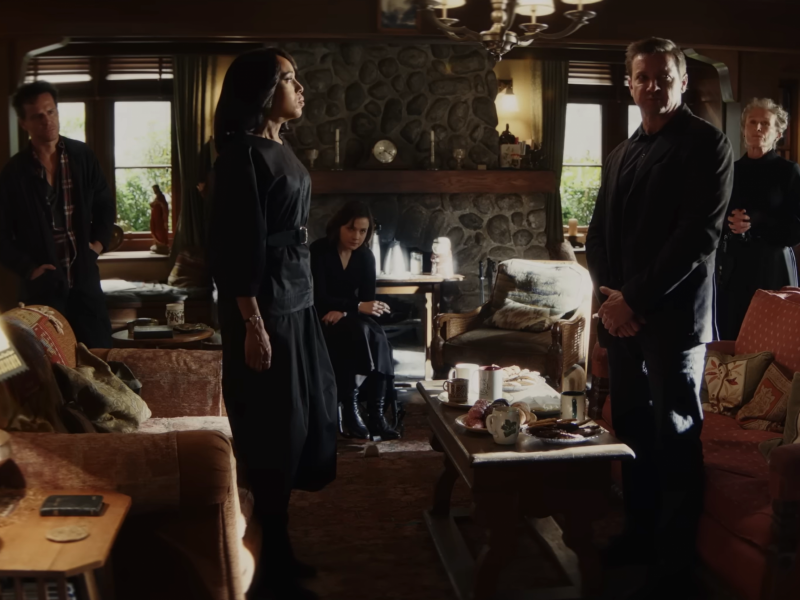Car Seat Headrest’s Teens of Denial
I think I get grunge now.
When I first heard about Car Seat Headrest’s Teens of Denial, I rolled my eyes, as I often do when music critics wax drooly over a neo-grunge album. The manufactured lo-fi production, the yawnable shoe gaze, the uninspired percussion — I’ll pass. Smashing Pumpkins ain’t my thing. Never really understood Pearl Jam (like, literally, I don’t know what he’s saying). I don’t like Nirvana (sorry).
But Car Seat Headrest is different.
The indie Leesburg, Virginia, outfit has kept the sunken, shreddy guitars, maintained the sad yelps, but added in a dash of dynamism that lifts those droopy lids. Organ strains and triumphant horns buoy harsher guitar rifts throughout. The result feels less like a methodic chug through dreary reflection and more like a nuanced stumble into the jagged, frightening, exhilarating world of millennial melancholy.
Will Toledo’s devastatingly accurate lyrics lay out the shittiest part of being a young human — the awkwardness, the fear of intimacy, the dread you’re not really the person you think you are — and that’s just in the 8-minute epic, “Cosmic Hero.”
To listen to Teens of Denial is to confront the worst parts of your life and yourself and come back better for it. The whole moody, beautiful mess makes it feel OK to be a mess, because at least someone else is, too. And despite being just as dirty and anti-establishment as your run-of-the-mill lo-fi LP, Teens of Denial has an lovely earnestness that pokes holes in the traditional I-don’t-give-a-fuck aesthetic.
Now, I’m a believer. You should be too.
— Danielle Ohl
Radiohead’s A Moon Shaped Pool
On Nov. 9, Radiohead frontman Thom Yorke didn’t tweet about how shocked he was by the results; he simply shared, “avoid all eye contact/ do not react,” from “Burn the Witch.” The song, whose lyrics relay the horrors of paralyzing conformity and thoughtless discrimination, had possibly existed since 2000. It functions as the high strung opening track of Radiohead’s prescient, political and passionate, early 2016 album, A Moon Shaped Pool.
“Politics” and “emotion” are words that were once, a long time ago, supposedly mutually exclusive. After an election cycle that split families down partisan lines and incited riots — the two now feel inseparable.
Some believe the only way to escape a disturbing society is to turn inwards. Other breathtaking album cuts, such as the woozy “Daydreaming,” find Yorke searching for temporary relief from the dystopian “frightening place” of “Glass Eyes” in crystalline arpeggios and a fantastic “white room/ by a window/ where the sun comes/ through.”
Unfortunately, dreams are only just. But the album ultimately chooses hope rather than fear, reality rather than imaginary.
Toward the close, it reminds us “the numbers don’t decide,” and more importantly, “true love waits,” always, lest we, in our panic, forget this singular and timeless fact.
— Christopher Wolff
I’ve never been to Malibu, but I bet Anderson .Paak’s album is better.
I was actually a little late to the .Paak party, but when Malibu finally charmed its way into my earbuds a month or two after it came out, I lost no time in catching up. Because .Paak — as anyone who’s seen him perform live knows — is going to be a superstar.
Like .Paak on stage, the album’s 16 songs don’t meander, but slyly bounce around, touching on each of the myriad of styles that make up hip-hop’s genetic code. Malibu isn’t a rap album, but it’s certainly informed by the genre’s conventions — .Paak is a naturally gifted storyteller and the album’s soft, luxurious bed of R&B, soul and funk provides the perfect backdrop for his charismatic, film-grain tales of family, childhood and burgeoning success.
It’s sunny enough to require those cool, perfectly-circular sunglasses that .Paak wears, and just shady enough that you won’t get burned once in the album’s hour-long runtime.
Not to mention it grooves like a motherfucker.
–Patrick Basler
Paul Simon’s Stranger to Stranger
Every generational voice eventually runs out of breath. From Bob Dylan to Bruce Springsteen, aging rock stars who previously crooned impassioned ballads of cultural subversion fade into obscurity, releasing stale pet projects from the echo chambers of their private, residual-funded home studios. As sure as the sun will rise and Drake will dance awkwardly in a sweater and mom-jeans, all music legends will succumb to this creative atrophy. All, it seems, except for Paul Simon.
In Stranger to Stranger, Simon deftly weaves together myriad threads of musical theory, dipping African woodwinds and Peruvian drumbeats in a glaze of Italian electronic sampling. When layered with his inventive lyrical flow, these seemingly discordant styles form a rhythmic, pulsating record unique to his 52-year career. The album boasts the wry, imaginative single “Wristband,” a fictional anecdote comparing Simon’s frustration with being locked out of his own concert to the exasperation of America’s heartland, locked out of wealth and prosperity by the shackles of income inequality. Character reprises abound, while minute-long instrumental riffs cleanse the listener’s palette, allowing Simon to effortlessly transition between charming tributes to his wife and melancholy reflections on the psychological provocations for mass-shootings and suicide. As a result, this album stands as a testament to Simon’s enduring penchant for eclecticism and innovation, proving that he truly is “still crazy after all these years.”
–Reuven Bank
In a contemporary musical scene plagued with repetitive sounds, Bon Iver has many times been a breath of fresh air. His 2016 release, 22, A Million, naturally follows suit.
This beautiful collection of songs about love and loss is filled with expressive writing and haunting melodies, and while it builds on similar sounds from the group’s previous work, the album is empowering, championing personal growth and change while previous albums held nostalgia above all else.
A labyrinth of an album, 22, A Million deserves the attention and time typically saved for poetry. The instrumentation adds a dimension to frontman Justin Vernon’s songwriting that allows you to feel the emotions he wants to associate with his music. While you digest the meaning of the words he sings with cerebral analysis, the music makes you feel his pain and pride, physiologically.
If listening to an album over and over is not for you, the songs stand alone as unique, striking pieces of musical art. To be moved by this album does not require an end-to-end understanding of Vernon’s messages, nor does seeking this comprehension take away from the stand-alone grace of the work.
–John Powers
Kendrick Lamar’s untitled unmastered .
Kendrick Lamar’s untitled unmastered., a compilation of songs that were recorded during the To Pimp a Butterfly sessions but did not make it onto the final version, is one of the best albums of the year and it further cements Kendrick’s place as one of the best MCs in the game right now.
By releasing a collection of previously unreleased tracks, Kendrick is saying that even the songs that didn’t make it onto his last album are good enough to listen to. He is making a statement that he is the best, and he delivers on that statement with hard verses and brilliant features.
— Jarod Golub
Panic! At The Disco’s Death of a Bachelor
“You’re just like Mike Love/ but you’ll never be Brian Wilson.”
Just let that sink in.
There are plenty of fantastic disses in 2016 music, but have you ever heard something so pretentiously scathing? Zing!
“Crazy=Genius” embodies the message Panic! At The Disco has sent to the modern punk genre. I’m not saying Death of a Bachelor is the next Pet Sounds, but it is the creative, “idgaf” move that punk rock desperately needed. This album breathes life into a genre of rock that has been lacking an exclamation point for a long time.
So thank you! P!ATD or more precisely; Brendon Urie, the punk reincarnation of Frank Sinatra. 2016 needed the strange “overcoats, canes and top hats” vibe P!ATD left in 2005.
Lyrically, Death of a Bachelor is poetry. Metaphors, rhymes, allusions, oh my. It’s proof that Brian Wilson unique doesn’t come from Mike Love lyrics.
Vocally, Urie is on another level (or should I say octave):
1:56-“Emperor’s New Clothes”
1:33-“Impossible Year”
2:12-“Death of a Bachelor”
Marked above are some Urie notes that would make any other “Best of 2016” candidate PTFO.
Death of a Bachelor combines 1930s swing music, 1990s guitar riffs, and 2000s+ beat tracks into a cohesive body of work, and still holds on to the classic story-telling album structure. It deserves a nod.
-Jay Reed
Chance the Rapper’s Coloring Book
With Coloring Book, Chance The Rapper didn’t just introduce himself to a larger audience than ever before, he greeted them enthusiastically with child-like joy. It’s an album that radiates positivity, making it not only the best-crafted major release of the year but also the most feel-good.
Even on the mixtape’s slower works, and I’m thinking specifically of “Summer Friends” and “Same Drugs,” the quality is stunning. In fact, those are the two best songs on the album. But, on the whole, Coloring Book feels celebratory. It’s a celebration of where Chance has been, where he’s from and, most excitingly, where he’s going. It’s clear on a single run through the album’s 14 tracks that, for Chance and for rap fans everywhere, the future is bright.
-Michael Errigo
Once again, Frank Ocean delivered. At first, Blonde confused me. It lacked the quick-hit appeal of its predecessor, Channel Orange. But its strength lies within its subtleties — the faint synths, purring instrumentation, Frank’s subdued vocals and an undercurrent of powerful messages regarding love, sexuality and race. It’s not a record with an immediate punch; instead, it’s a slow burning cry of love denied, lessons learned and growing optimism for the future.
Blonde, as I expected, grows better with more plays and a commitment to view it as a cohesive work that deserves to be listened to from front-to-back. It begins with the pitched vocals of “Nikes” overtop a whirling and ethereal beat. It transitions to the lonesome, weed-hazed musings of “Solo” before reaching its pensive high on “White Ferrari” where Frank croons “I care for you still and I will forever” over minimalist strums of guitar. It’s an album of unabashed feeling and personal declarations of a love that could have been, and an album of understated yet pristine production that soothes the soul. It’s the perfect record to be enjoyed with a glass of wine in the quiet of the night, with only your thoughts to accompany you.
-Josh Magness



